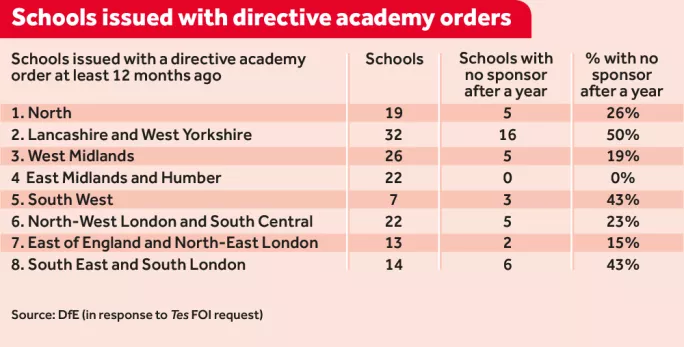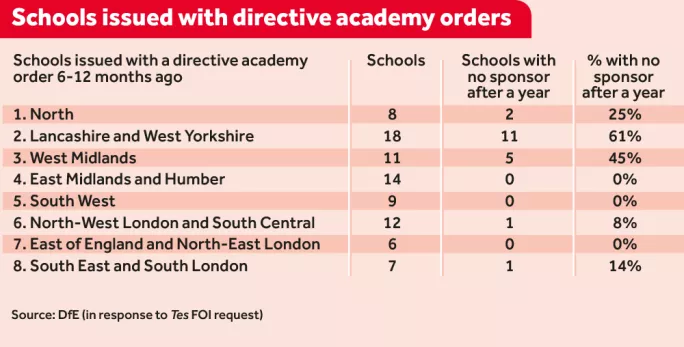Are the government’s academy threats all talk and no action?

The new law was clear and unambiguous: every school that Ofsted judges to be “inadequate” must become an academy.
For the government, this would ensure that schools in most need of improvement would swiftly receive the help ministers believed would turn them around - being sponsored by a strong academy trust.
When the new measures were passed as part of the Education and Adoption Bill in February 2016, schools minister Nick Gibb said: “The bill will raise standards in schools by allowing us to tackle failure from day one, ensuring swift action is taken wherever a school is not providing the high standards of education rightly expected by parents.”
But new figures have revealed that, far from being a speedy process, a year after being issued with one of the new-style directive academy orders, more than a quarter of schools had still not been matched to a sponsor.

Geoff Barton, general secretary of the Association of School and College Leaders, describes the situation as “serious”.
“It leaves schools as orphan schools. Having been stigmatised and told what the solution would be, and then it not happening, it can’t be helpful to the school,” he says.
A Department for Education response to a Tes freedom of information request shows that, of 155 directive academy orders that had been in place for at least a year, in 42 cases the school had yet to be matched with an academy trust that would take it over.
And there were big regional variations, with all schools in the East Midlands and Humber region that were issued with a directive academy order matched to a sponsor within a year, but half of those in Lancashire and West Yorkshire not.
The DfE said that, where schools had not been matched with sponsors, “this will be because discussions with potential sponsors are in progress and a final decision on a sponsor match will be made in due course.”
The findings go to the heart of some of the most pressing questions about the academy programme: is academisation the best solution in every case, are there enough sponsors to achieve the government’s ambitions, and what happens when a school is in such difficulty that no one wants to risk taking it on? Barton says it highlights a lack of capacity in a system “creaking with the weight of expectation”.
Finding other solutions
For Robert Hill, an education consultant and former Downing Street adviser to Tony Blair, “the blanket legal mechanism was always something of a blunt instrument - while sponsorship can be an effective intervention for a failing school, as the sponsorship programme under the Blair government showed, there are other ways of turning round these schools”.
And the issue of “untouchable schools” - those with financial or academic problems that scare off potential sponsors - remains.
Matthew Wolton, a partner specialising in academies at law firm Knights, says: “You can force a school to become an academy, but you can’t force an academy trust to take on a school. The government can say a school must become an academy, but that means finding a trust that’s willing to take it on - and is the right trust to take it on.
“It’s not surprising, therefore, that you have various parts of the country that are better at dealing with this.”
But while this may cause a delay in schools getting the solutions the government believes they need, Wolton believes this might be beneficial in the longer term, with regional schools commissioners “taking their time to find the right person for a school, rather than taking the first person just to get it off their books”.
Although the legal compulsion for “inadequate” schools to become academies remains in place, Barton believes that the DfE under Justine Greening is now less ideological in its commitment to academies.
“I think we are moving to a more pragmatic era and I think that’s a good thing, as long as communities don’t think they have schools that are being cast adrift,” he says.
A DfE spokesperson says: “Our priority is to ensure all children receive the best possible education, and high-quality sponsors raise standards in underperforming schools, bringing fresh vision, strong leadership and clear accountability. We have a track record of delivering a significant supply of high-quality sponsors for schools. Regional Schools Commissioners are well-placed to understand and respond to the needs of their regions so that schools are matched to a successful sponsor and improvement support is in place.”


You need a Tes subscription to read this article
Subscribe now to read this article and get other subscriber-only content:
- Unlimited access to all Tes magazine content
- Exclusive subscriber-only stories
- Award-winning email newsletters
Already a subscriber? Log in
You need a subscription to read this article
Subscribe now to read this article and get other subscriber-only content, including:
- Unlimited access to all Tes magazine content
- Exclusive subscriber-only stories
- Award-winning email newsletters